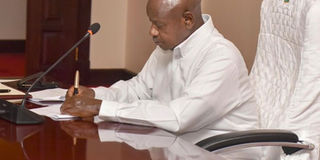Government should promote unity to end tribalism

President Museveni unwittingly continued the debate and worsened it by reducing a country of 56 tribes to just a handful from central against Banyankoore of western Uganda
The recent tribal debates that dominated the socio-political space in the country and drew out the President are unfortunate. They leave a lot to be desired about a ‘nation’ that should be proudly celebrating its multi-ethnic identity.
Having 56 tribes alone does not make a nation. The country needs to do more for the multi-ethnic populace to proudly call themselves nationals of Uganda.
When the President came out on Twitter, he warned Ugandans to “leave our armed forces out of the nonsense of tribal debates” and, on the defensive, reminded citizens that his guerilla warfare was fought in Buganda and that the fighters comprised many ethnic bantu peoples.
In retrospect, the President unwittingly continued the debate and worsened it by reducing a country of 56 tribes to just a handful from central against Banyankoore of western Uganda.
Do the Kumam, Alur, Lugbara, Japadhola, Lango, Iteso… have a place in this nation beyond appearing on the map and in the Constitution? Why must discussions about Uganda be centered on one or two Bantu ethnic groups?
The government should make a nation with a people united and proud of belonging irrespective of the size of their ethnic grouping.
For decades, citizens have only seen water sprinkled on burning tribal coals, leaving embers to smolder back into fire.
About 10 years ago, government floated the idea of teaching patriotism in schools through military drills (mchaka-mchaka). A law was drafted seeking to make patriotism compulsory so that citizens would protect public resources and fight corruption.
This newspaper wrote on this page on March 14, 2014, that it was a futile draft law and noted that patriotism is not enforced but rather inculcated in the population.
This paper advised the government to achieve that by delivering on its obligations that make citizens proud of belonging such as a sound economy, good roads, quality education, justice system, freedom and democracy and improved livelihoods.
That citizens are still grumbling about who is who in key positions in government is a testament that they have been frustrated into seeking consolation in having one of their own in leadership positions – the so-called ‘our time to eat.’
Endemic corruption and unbalanced distribution of resources have never made nationalists of anyone.
These are issues that can neither be solved with the President’s lecturers and warnings, nor the government fanatics’ heckling and listing of office holders from other tribes.
The government must look deeper and foster national unity.




